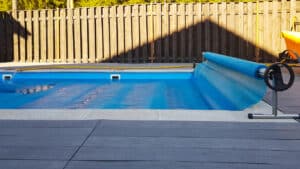If you’re maintaining your own pool, one of your main expenses will be the chemicals required to keep the pool sanitary and clear. Some pool owners get very frustrated with how often they have to add chemicals to their pool. This can be a major nuisance and expense that keeps them from enjoying their pool.
Although you can’t completely eliminate the need for chemicals in your pool, there are some steps that you can take to extend the life of the chemicals in your pool.
Chlorine is the most important chemical in your pool. You must maintain a high concentration of free chlorine to kill microorganisms in the pool and break down contaminants like urea. There are two main reasons why your chlorine breaks down in the pool: sunshine and excessive contamination.
Controlling contamination is the point of having chlorine, but whenever contaminants enter your pool, they burn up some of your chlorine. Reducing contamination in your pool will help your chlorine last longer. One step you can take is taking a shower before getting into your pool. It doesn’t have to be a thorough shower, but a quick rinse will remove a lot of sweat and oil from your skin, so it doesn’t get into the pool.
Look in your yard for sources of contamination. If there’s a garden or an area of grass near the pool that has loose dirt, this can blow into the pool, which can consume chlorine. Cover areas of loose dirt near your pool. Another problem is if you mulch your lawn clippings, and they blow into the pool.
Another tip for keeping contaminants out of your pool is to use your pool cover whenever you’re not swimming in your pool.

There are many strategies you can use to protect chlorine from sunshine. The easiest is to use your pool cover whenever you’re not swimming in your pool. This has the double benefit of also keeping out contamination.
You can also have a sunshade that covers over part of the pool, reducing the amount of direct sunlight it receives. This can also help your pool water stay cool. Having overhanging trees can provide this benefit, too, but then you will have leaves drop into the pool, so it’s a tradeoff.
Finally, you can add cyanuric acid (CYA) to your pool as a chlorine stabilizer. CYA reduces chlorine loss due to sunlight. However, it can also be hard to maintain CYA levels in your pool.
CYA works well to stabilize chlorine in your pool, but is also vulnerable to breaking down. When it breaks down, it turns into a contaminant that your chlorine reacts with to remove from the pool. If too much CYA breaks down, it can have a net negative effect on your chlorine levels.
What breaks down CYA? Bacteria. When you get bacteria growing in your pool, it will utilize the CYA and excrete ammonia. This ammonia reacts readily with chlorine, and it can eat up your chlorine levels.
To protect your pool against this problem, it’s a good idea to use a preventive application of algaecide. This will help you maintain your CYA levels – and your chlorine levels, because chlorine is also consumed combatting a growing algal population.
When you open your pool, you will need to take careful steps to get it ready for the season.
After that, if you want to make sure your pool is always swim-ready when you’re ready to swim, it’s good to get in the habit of performing weekly pool maintenance. Every week you should test your water and add:
The chlorine keeps your pool sanitary. The CYA helps stabilize your chlorine, and the algaecide helps control algae that might otherwise consume your CYA.
Clarifiers bind contaminants in the pool, making them easier to filter out. This can sometimes extend the life of chlorine as well as helping to make your pool water as clear as possible. It’s important to read safety guidelines on your pool clarifier to know when it’s safe to use a pool after adding clarifiers.
As you can see, pool maintenance can be a challenge. Weekly maintenance isn’t as simple as just adding all the same amounts of chemicals as you added last week. It can take time for testing and adjusting the chemical levels.
If you want to enjoy a hassle-free experience with your pool, turn the maintenance over to professionals who know how to always maintain a clean and swim-ready pool.
At Allen Pool Service, we’ve been helping people in Atlanta enjoy their pools since 1972. We offer high-quality pool renovation, pool repair and pool maintenance services. We can take over maintaining your pool so you can get the most enjoyment out of your pool with the least trouble possible.
To schedule pool maintenance in Atlanta, please call or use our online form today to contact Allen Pool Service.
Please call (770) 451-1621 to request pool winterization by Allen Pool Service in Atlanta.
Request Now